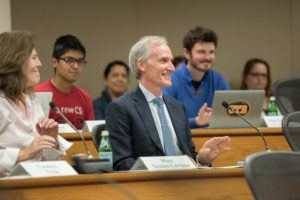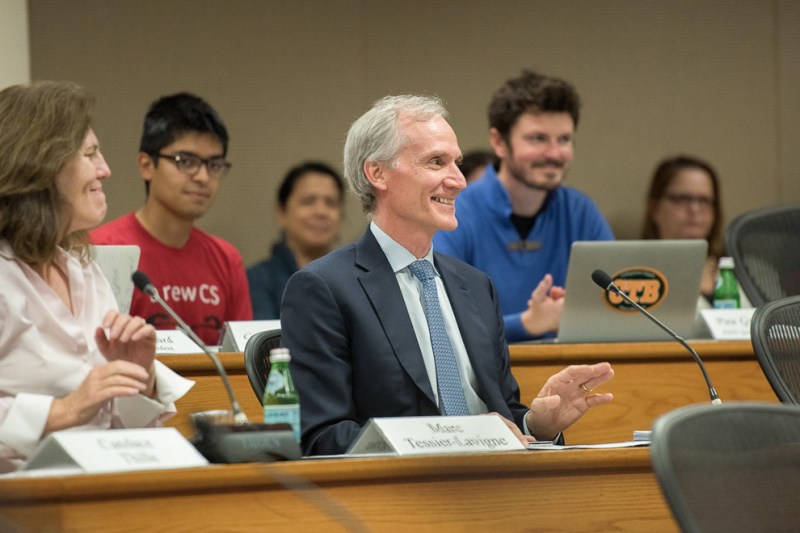President Marc Tessier-Lavigne spoke to the 49th Faculty Senate in its first meeting of the year yesterday. The Faculty Senate also received and discussed reports from the Policy and Planning Board (PPB) regarding trends in undergraduates’ choice of majors and the Task Force on Women Leadership about changing climate surrounding campus leadership.
President’s speech

Tessier-Lavigne gave a brief preview of his upcoming inaugural speech and updated the Faculty Senate on his activities since his first day in September. He expressed that he has focused on four priorities outside of the day-to-day operations of the university: Reaching out, introducing himself to the Stanford community, appointing the new provost and beginning to plan for the next five to 10 years of his time at Stanford.
According to his speech, Tessier-Lavigne has already been in contact with many staff and faculty and is starting to reach out to the student population. He has also introduced himself to the local community, including meeting with the mayor of Palo Alto.
Throughout these introductions, Tessier-Lavigne said he has been asking community members the questions, “How can we make Stanford better and what advice do you have for me as I start [my term]?”
Tessier-Lavigne hopes to announce the new provost in November.
Trends in undergrad majors
Russell Berman, chair of the PPB, and Brian Cook, assessment and program evaluation analyst, presented data regarding trends in undergraduates’ choice in majors.
Since 2010, the number of engineering majors has shot up to 37 percent of the student population. In this same time, the percentage of students studying social science has significantly decreased.
There remains a large gender gap in engineering, with 48 percent of men majoring in engineering and only 25 percent of women doing the same. However, ethnicity seems to have no significant impact on declaring an engineering degree; 37 percent of underrepresented minorities (URM) and 37 percent of those without URM status study engineering.
According to the report, the increased numbers in engineering come primarily from the upshot of people declaring computer science. The decrease in social sciences, meanwhile, is mostly attributable to a drop in the number of economics majors, according to Cook.
Berman suggested that the drift into engineering majors could be partly attributed to students choosing majors for vocational reasons. He stated that economics used to be the major to choose for finance jobs on Wall Street, but recently, computer science has become an attractive alternative.
While Berman questioned whether the increasing shift towards engineering is an issue in the first place, Richard Saller, dean of the School of Humanities and Sciences, was concerned that the skew towards engineering is changing the undergraduate experience.
“I’ve repeatedly heard talk among students that there’s a sense that the humanists are doing an easier, second-class education,” Saller said.
Other professors were more interested in course enrollment, which some saw as a better indicator of breadth in education. Data on this, however, is currently unavailable.
Women leadership
Margot Gerritsen, senior associate dean for educational initiatives, gave a brief overview of the climate surrounding faculty leadership. The task force addressed several reasons that may be stopping faculty from obtaining leadership roles, including the high opportunity costs and the loss of prestige for leadership roles.
Gerritsen also described a few tools that could be used to lessen these obstacles, such as nurturing individuals for leadership. However, many professors expressed skepticism about the ease of changing campus culture.
For instance, political science professor Judy Goldstein argued that the deep focus on research creates a feeling that leadership roles for faculty are less valuable.
Contact Christina Pan at capan ‘at’ stanford.edu.
